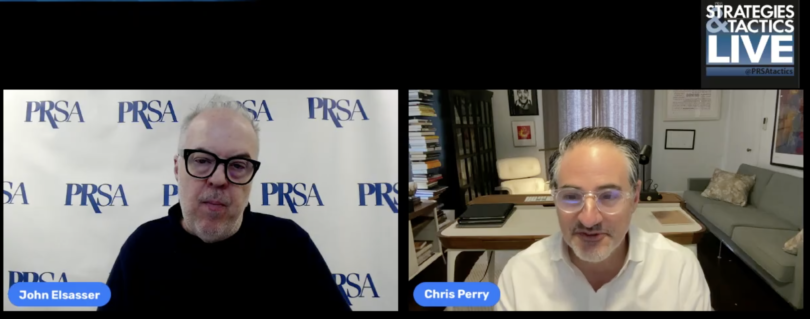In 2023, “AI has become a huge topic,” said Chris Perry, chair of Weber Shandwick Futures, the communication firm’s research and development lab that seeks to help PR agencies and their clients adapt to the major changes that artificial intelligence is causing.
Since bursting into the public consciousness in November 2022 with the debut of ChatGPT, artificial intelligence has signified “a profound shift in society, media and culture,” said Perry, the December guest for Strategies & Tactics Live, PRSA’s monthly interview series on LinkedIn.
“We need to think about some of the longer-term implications of AI and how we behave and how we relate to each other, the media we consume,” etc., Perry said.
John Elsasser, editor-in-chief of PRSA’s award-winning publication Strategies & Tactics and host of S&T Live, asked Perry how PR professionals can begin adopting artificial intelligence technology while also keeping its ethical implications in mind.
To understand the long-term ramifications of artificial intelligence in communications, “We need to get into these tools and use them… to objectively see where they can help us as thinkers and communicators,” Perry said.
‘Caution and skepticism’
Learning to use AI while also trying to anticipate its future effects requires PR professionals to strike “a delicate balance between thinking about the applications of these tools and the implications of these tools, simultaneously,” Perry said. He advises organizations and PR teams to create guidelines for how to harness artificial intelligence in their businesses.
When using AI in communications, “We have to be strategic and in some cases, safe, in how we use these tools, especially on behalf of our clients and the companies that we work for,” Perry said.
Communicators have been slow to adopt artificial intelligence technology in their work, he said. “Relatively speaking, [AI] is still very new. For good reasons, many in the profession are showing caution and skepticism.”
In Perry’s view, artificial intelligence will help form a new discipline in the PR profession. “Through practice and extrapolating from that practice, you can determine how these AI tools are going to not necessarily automate what we do, but elevate what we do,” he said. “These are tools that can make us better, not take our jobs.”
Besides their ability to generate media, AI software such as ChatGPT can be “incredible research partners,” Perry said. Since ChatGPT became publicly available a little over a year ago, communicators have tended to think about the technology primarily as a way to generate texts and images, while “overlooking how powerful [AI is] from a research standpoint,” he said.
“I think we have to flip the way that we think about these tools — less as something that can write a press release or an essay for us, and more about how these tools can help us elevate our thinking, elevate our creativity and elevate the work that we all produce to make a difference in the world.”
PR professionals “can’t sit around and talk about generative AI,” Perry said. “We have to get busy with this stuff. It’s a force that we can’t ignore.”
You can watch the playback on LinkedIn here.







